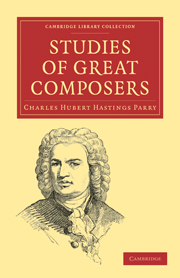X - ROBERT SCHUMANN
Published online by Cambridge University Press: 29 August 2010
Summary
In the early part of the history of modern music, the aims of the greatest composers seem easily intelligible to those who come after. The roads to great achievements were open in all directions, and after preliminary difficulties had been overcome by men whose names have for the most part passed out of remembrance, the great heroes of the art came upon the scene, and with strenuous vigour made sure of one new province of art after another, till by the second quarter of the present century there hardly seemed any new lands left to conquer. The great provinces of oratorio, opera, symphony, and song, were taken complete possession of, and the artistic principles upon which they needed to be worked out seemed theoretically to be so thoroughly well settled and decided, that it is not easy to see what was left for great composers to do. The matter of merely improving upon an established form of art is not nearly so enticing as the perfecting of one which is not mature, and does not seem to offer such opportunities for individual distinction. In art just as in the circumstances of outward life, it is always more inspiriting to adventure into new lands and open them up for the first time, than it is to cultivate and improve them when some one else has discovered and conquered them. When great material resources are at the command of many people, there are plentiful opportunities for average men to make themselves useful, but less for individual men to tower into rare eminence above their fellows.
- Type
- Chapter
- Information
- Studies of Great Composers , pp. 289 - 321Publisher: Cambridge University PressPrint publication year: 2009First published in: 1887



